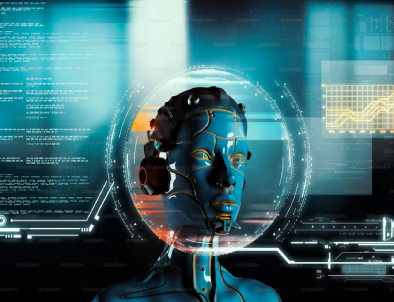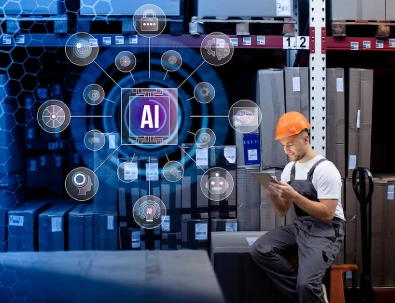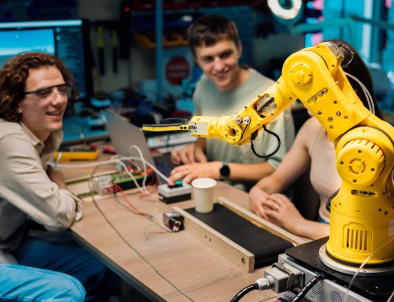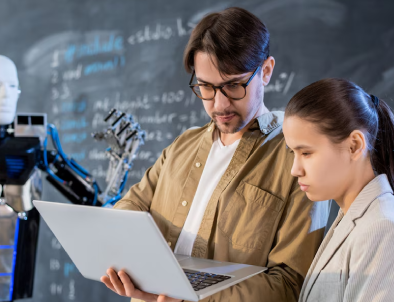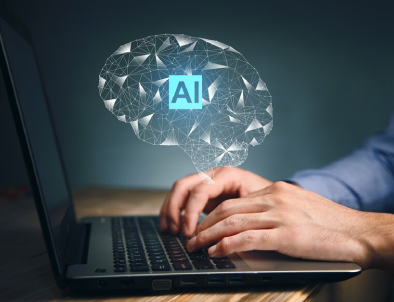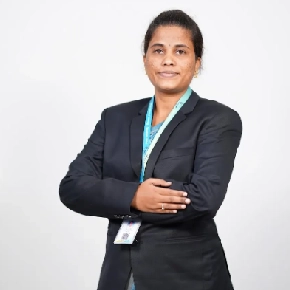Programme Level
Under Graduate
Duration
4 Years
About the Programme
Program Overview
AI graduates have diverse career options across industries, from building and deploying machine learning models as Machine Learning Engineers to analyzing data patterns as Data Scientists. They can work as Research Scientists, pushing the boundaries of AI innovation, or specialize in fields like Computer Vision and Natural Language Processing to develop image and language-based solutions. Roles like AI Product Manager and AI Consultant combine technical and strategic skills to implement AI-driven products effectively.
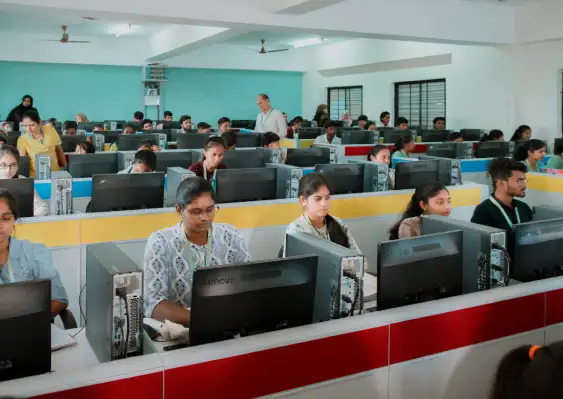

Opportunities also exist in niche fields, such as AI Ethics, Financial Services, Healthcare, and AIOps, allowing AI professionals to shape responsible, innovative applications. With AI's rapid growth, these careers offer promising pathways with significant impact potential.
The Bachelor of Engineering (B.E.) course in CSE(Artificial Engineering) is a 4-year professional undergraduate program. The Computer Science & Engineering (Artificial Intelligence) program is designed to equip students with the knowledge and skills to develop intelligent systems capable of mimicking human cognitive functions. Gain a strong understanding of core computer science concepts like algorithms, data structures, programming languages, software engineering, and computer architecture. The program focuses on practical applications of AI and ML.
Eligibility Criteria
Students who have passed Karnataka 2nd PUC/ 12th Std, / 10+2 / Intermediate or equivalent exam with Physics & Mathematics along with Chemistry/ Computer Science / Biology and any other optional subject with English as one of the languages of study and should have obtained a minimum of 45% marks. For SC/ST & other backward classes of Karnataka students only, the minimum marks is 40% in aggregate in the optional subjects in the qualifying examination, irrespective of marks obtained in the Common Entrance Test / COMED-K/ AIEEE.
Career Options
A degree in Computer Science & Engineering (Artificial intelligence)
Program Fees
Duration
4 Years
Program
CSE-Artificial Intelligence (AI)
Type
- SNQ
- CET
- COMED-K
- MANAGEMENT
Amount
- Rs. 46,360/-
- Rs. 1,22,495/-
- Rs. 3,070,87/-
- Rs. 2,65,000/-
Admission Process
Students who have passed Karnataka 2nd PUC / 12th std / 10+2 / Intermediate or equivalent exam with Physics & Mathematics along with Chemistry / Computer Science / Biology and any other optional subject with English as one of the languages of study and should have obtained a minimum of 45% marks.

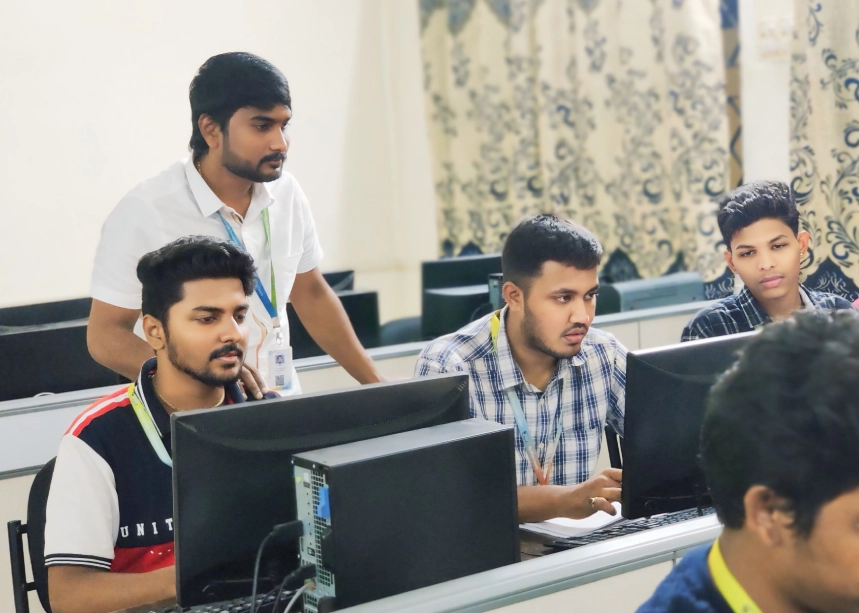
For SC/ST & Other backward classes of Karnataka students only, the minimum marks is 40% in aggregate in the optional subjects in the qualifying examination, irrespective of marks obtained in the Common Entrance Test / COMED-K / AIEEE / any other equivalent entrance examinations. (Eligibility as per the Govt. Norms from time to time).
Programme Educational Objectives (PEOs)
PEO-1
Accomplish a progressive career by applying fundamental principles and design methodologies of computer science and engineering.
PEO-2
Provide practical solutions to solve problems of industry and society at large.
PEO-3
Exhibit professionalism through managerial skills and develop innovative products.
Program outcomes (POs)
PO 1
Engineering knowledge
Apply the knowledge of mathematics, science, engineering fundamentals, and an engineering specialization to the solution of complex engineering problems.
PO 2
Problem analysis
Create, select, and apply appropriate techniques, resources, and modern engineering and IT tools including prediction and modeling to complex engineering activities with an understanding of the limitations.
sis: Identify, formulate, review research literature, and analyze complex engineering problems reaching substantiated conclusions using the first principles of mathematics, natural sciences, and engineering sciences.
PO 3
Design/development of solutions
Design solutions for complex engineering problems and design system components or processes that meet the specified needs with appropriate consideration for public health and safety, and cultural, societal, and environmental considerations.
PO 4
Conduct investigations of complex problems
Use research-based knowledge and research methods including design of experiments, analysis and interpretation of data, and synthesis of the information to provide valid conclusions.
PO 5
Modern tool usage
Create, select, and apply appropriate techniques, resources, and modern engineering and IT tools including prediction and modeling to complex engineering activities with an understanding of the limitations.
PO 6
The engineer and society
Apply reasoning informed by the contextual knowledge to assess societal, health, safety, legal & cultural issues and the consequent responsibilities relevant to the professional engineering practice.
PO 7
Environment and sustainability
Understand the impact of professional engineering solutions in societal and environmental contexts, and demonstrate the knowledge of, and need for sustainable development.
PO 8
Ethics
Apply ethical principles and commit to professional ethics & responsibilities and norms of the engineering practice.
PO 9
Individual and team work
Function effectively as an individual, and as a member or leader in diverse teams, and in multi-disciplinary settings
PO 10
Communication
Communicate effectively on complex engineering activities with the engineering community and with society at large, such as being able to comprehend and write effective reports and design documentation, make effective presentations, and give and receive clear instructions.
PO 11
Project management and finance
Demonstrate knowledge and understanding of the engineering and management principles and apply these to one's work, as a member and leader in a team, to manage projects and in multidisciplinary environments.
PO 12
Life-long learning
Recognize the need for, and have the preparation and ability to engage in independent & life-long learning in the broadest context of technological change.
Programme Specific Outcomes
PSO 1
Demonstrate the principles, architecture and organization of computers, embedded systems and computer networks.
PSO 2
To develop software applications using advanced technologies to cater the growing needs of industry.
Program Curriculum 2022 Scheme
| Sl No | Course code | Course Name |
|---|---|---|
| 1 | 22MATS11 | Mathematics for CSE Stream-I |
| 2 | 22PHYS12 | Physics for CSE stream |
| 3 | 22POP13 | Principles of Programming Using C |
| 4 | 22ESC14x | Engineering Science Course-I |
| 5 | 22ETC15x | Emerging Technology Course-I |
Or |
||
| 22PLC15x | Programming Languages Course-I | |
| 6 | 22ENG16 | Communicative English |
| 7 | 22KSK17 22KBK17 |
Samskrutika Kannada/Balake Kannada |
Or |
||
| 20ICO17 | Indian Constitution | |
| 8 | 22IDT18 | Innovation and Design Thinking |
Or |
||
| 22SFH18 | Scientific Foundations of Health | |
| Sl No | Course code | Course Name |
|---|---|---|
| 1 | 22MATS21 | Mathematics for CSE Stream-II |
| 2 | 22PHYS22 | Physics for CSE Stream |
| 3 | 22POP23 | Principles of Programming Using C |
| 4 | 22ESC24x | Engineering Science Course-II |
| 5 | 22ETC25x | Programming Language Course-II |
Or |
||
| 22PLC25x | Emerging Technology Course-II | |
| 6 | 22PWS26 | Professional Writing Skills in English |
| 7 | 22KSK27 22KBK27 |
Samskrutika Kannada/Balake Kannada |
Or |
||
| 20ICO27 | Indian Constitution | |
| 8 | 22IDT28 | Innovation and Design Thinking |
Or |
||
| 22SFH28 | Scientific Foundations of Health | |
| Sl No | Course code | Course Name |
|---|---|---|
| 1 | 22MCS31 | Graphtheory and Discreet Mathematical Structures |
| 2 | 22CS32 | Digital System Design and Computer Organization |
| 3 | 22CS33 | Operating System |
| 4 | 22CS34 | Data Structures and Applications |
| 5 | 22CSL35 | Data Structures Lab |
| 6 | 22CS36 | ESC/ETC/PLC Object Oriented Programming With JAVA |
| 7 | 22CS37 | Social Connect and Responsibility |
| 8 | 22CS38X | Ability Enhancement Course/Skill Enhancement Course -III |
| 9 | 22NS39 | National Service Scheme(NSS) |
| 22PE39 | Physical Education (PE)(Sports and Athletics) | |
| 22YO39 | Yoga |
| Sl No | Course code | Course Name | |
|---|---|---|---|
| 1 | 22BB41 | Biology for Engineers | |
| 2 | 22CS42 | Micro Controllers and Embedded System | |
| 3 | 22CS43 | Database Management Systems | |
| 4 | 22CS44 | Analysis and Design of Algorithms | |
| 5 | 22CSL45 | Algorithms Lab | |
| 6 | 22CS46X | ESC/ETC/PLC | |
| 7 | 22PSW4 | Professional Skills for the workplace | |
| 8 | 22UH48 | Universal human values course | |
| 9 | 22NS49 | National Service Scheme(NSS) | |
| 22PE49 | Physical Education(PE)(Sports and Athletics) | ||
Engineering Science Course(ESC/ETC/PLC) |
|||
| 22CS461 | SystemSoftware | 22CS462 | Object Oriented Programming with Python |
| 22CS463 | Introduction to Data Analytics | ||
| Sl No | Course code | Course Name |
|---|---|---|
| 1 | 22CS51 | Software Engineering& Project Management |
| 2 | 22CS52 | Computer Networks |
| 3 | 22CS53 | Artificial Intelligence |
| 4 | 22CSL54 | Artificial Intelligence Lab |
| 5 | 22CS55X | Professional Elective Course |
| 6 | 22CSMP56 | Mini Project |
| 7 | 22ADA57 | Ability Enhancement Course/Skill Development Course |
| 8 | 22ES58 | Environmental Studies |
| 9 | 22NS59 | National Service Scheme(NSS) |
| 22PE59 | Physical Education(PE) (Sports and Athletics) | |
| 22YO59 | Yoga | |
Professional Elective Courses |
||
| 22CS551 | Automata Theory& Compiler Design | |
| 22CS552 | Computer Graphics& Visualization | |
| 22CS553 | NoSQL | |
| 22CS554 | UI/UX | |
| Sl No | Course code | Course Name |
|---|---|---|
| 1 | IPCC 22CS61 |
Cloud Computing with AWS |
| 2 | PCC 22CS62 |
Machine Learning |
| 3 | PEC 22CS63X |
Professional Elective Course |
| 4 | OEC 2264X |
Open Elective Course |
| 5 | PROJ 22CSP65 |
Project Work – Phase-I |
| 6 | PCCL 22CSL66 |
Machine Learning Lab |
| 7 | AEC 22RM67 |
Research Methodology& IPR |
| 8 | 22NS68 | National Service Scheme(NSS) |
| 22PE68 | Physical Education(PE) (Sports and Athletics) |
|
| 22YO68 | Yoga | |
Professional Elective Courses |
||
| 22CS631 | DevOps | |
| 22CS632 | Natural Language Processing | |
| 22CS633 | Data Visualization with Power BI | |
| 22CS634 | Block Chain Technology | |
Open Elective Courses |
||
| 22CS641 | Data Structures and Applications | |
| 22CS642 | Data Base Management System | |
| 22CS643 | Operating System | |
| 22CS644 | UI /UX | |
Faculty
Admission to Higher Semester:
- After the announcement of the reopening date of the college, the candidates have to register for admission with an application enclosing all the photos copies of previous semester marks card/s through their department HOD and they have to pay the applicable Tuition Fees / Registration Fees within a week of reopening the institute for class work.
- The students who fail to register within the first week of re-opening, the student will be charged a penalty
- The names of the students will be deleted, in case they fail to register as per the schedule
- Any financial matters are required to be referred to the principal only
- Once the student is admitted he/she will be under the guidance of the department and all the academic matters should be addressed through the Head of the department only.
- Students are expected to maintain discipline in the college campus & not to indulge in “Ragging Activities”.
FAQs
CSE-AI is a dynamic and rapidly evolving field with several compelling reasons for its prominence:
- Innovation and Advancements: CSE-AI drives innovation by developing intelligent systems capable of learning from data and making decisions. This leads to advancements in various industries and their applications.
- Problem Solving: CSE-AI provides tools to tackle complex problems that traditional algorithms might struggle to address. This includes image and speech recognition, natural language processing, and autonomous systems.
- Interdisciplinary Applications: CSE-AI intersects with various disciplines, fostering collaborations and interdisciplinary research. It finds applications in fields such as robotics, neuroscience, and bioinformatics.
- Emerging Technologies: As emerging technologies like the Internet of Things (IoT) and augmented reality become more prevalent, CSE-AI plays a crucial role in developing intelligent systems that can harness the potential of these technologies.
- Demand in Industry: There is a growing demand for professionals with expertise in CSE-AI across industries. Companies are leveraging these technologies to gain a competitive edge and improve their operations.




